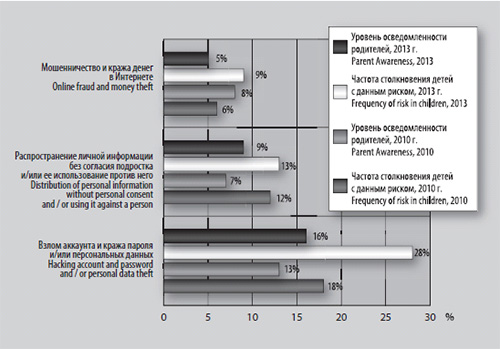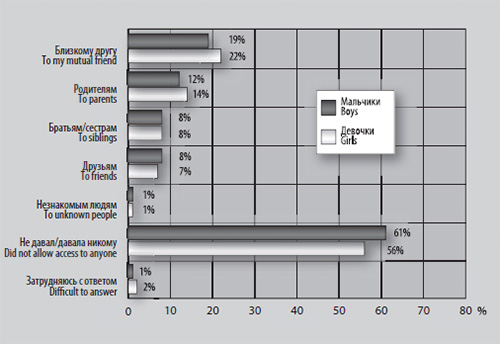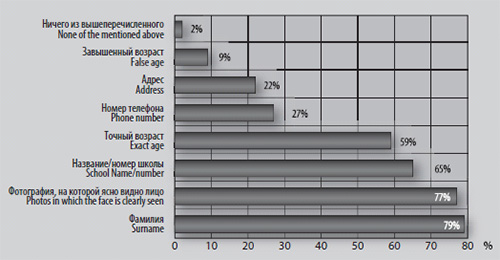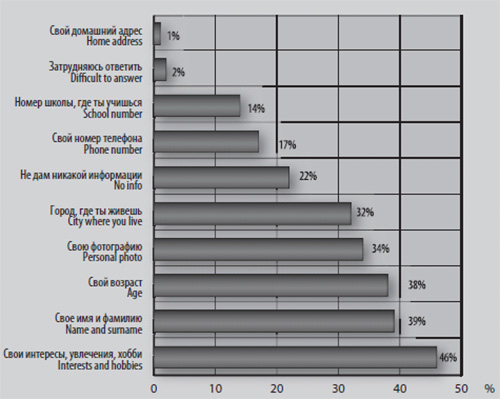Attitude to privacy and protection of personal data: safety of Russian children and teenagers.
Recieved: 08/16/2015
Accepted: 08/27/2015
Published: 11/15/2015
Pages: 56-66
DOI: 10.11621/npj.2015.0306
Keywords: privacy; personal data; Internet; privacy settings; social networking; Russian schoolchildren
Available online: 15.11.2015
Soldatova, G.U., Olkina, Oxana I. (2015). Attitude to privacy and protection of personal data: safety of Russian children and teenagers.. National Psychological Journal, (3) , 56-66. https://doi.org/10.11621/npj.2015.0306
Copied to Clipboard
CopyAbstract
The paper examines the existing approaches to privacy in modern psychology. Basic directions of studying privacy and protection of personal data in the online environment through various scientific approaches are analyzed. Protection of personal data being one of privacy kinds is deemed as a relevant issue of safety of today’s children and adolescents, i.e. Internet users. Based on population studies data and content analysis of social networking the ratio of Russian children and adolescents to personal data is analyzed, the problems arising from its misuse, and also parents’ attitudes to this issue and the possibility of their assistance to their children in the protection of personal data are emphasized.
The research shows that at least one-third of Russian adolescents make a group of risk and may be affected by the risks posed by careless handling of personal information, because these children do not always respect the principle of confidentiality in respect of passwords; they establish open access to a personal page, allowing access to any registered user; personal profile specifies a set of personal information about themselves to the maximum extent; they are willing to share personal information with strangers; to no one to seek help on issues related to privacy settings in the Network.
The results show that not only the children but also their parents greatly underestimate the hidden dangers of careless use and storage of personal data on the Internet.
Russian schoolchildren have developed a commonly shared digital generation outlook but they still preserve different look at privacy in general and personal data in particular. Education of children and adolescents safety is emphasized to be a priority for parents and schools within the framework of promoting a culture of Internet use.
Diagram 1. Children of 11-16 years face problems arising as a result of careless handling of personal data and the level of parent awareness, 2010, 2013

Diagram 2. Adolescents answers the question «Have you ever disclose password of your account on a social network or e-mail?» (Sample includes all adolescents who use the Internet), 2013

Diagram 3. Adolescents answers the question «What information about you does your profile include?» (Sample includes all adolescents who have a profile on a social network) 2010

Diagram 4. Adolescents answers the question «If you met on the Internet with a new friend and he wants to know more about you what information about yourself are you likely to disclose?», 2013

Referneces
Altman, I. (1975) The Environment and Social Behavior: Privacy, Personal Space, Territory and Crowding. Monterey, CA, Brooks / Cole Pub. Co., Inc.
Castells, M. (2000) Informatsionnaya epokha: ekonomika, obshhestvo i kul'tura [The Information Age: Economy, Society and Culture]. Moscow, GU VShE.
Children's Online Privacy Protection Rule (COPPA). Federal Trade Commission official website, USA. – Mode of Access: https://www.ftc.gov/enforcement/rules/rulemaking-regulatory-reform-proceedings/childrens-online-priv... - (Date of circulation: 05.08.2015).
Children's Online Privacy Protection Act (COPPA). Federal Reserve System Official Website, USA. - Mode of Access: http://www.federalreserve.gov/boarddocs/supmanual/cch/200601/coppa.pdf - (date of circulation: 05.08.2015).
Clarke, R. What's 'Privacy'? - Mode of Access: http://www.rogerclarke.com/DV/Privacy.html#Defn - (date of circulation: 04.08.2015).
Clement, A. (1994) Considering Privacy in the Development of Multimedia Communications. Computer Supported Cooperative Work. 2, 67-88.
Debatin, B., Lovejoy, J.P., Horn, A., Hughes, B.N. (2009) Facebook and online privacy: attitudes, behaviors, and unintended consequences. Journal of Computer-Mediated Communication. Vol. 15, Issue 1, 83-108.
Ellison, N.B., Vitak, J., Steinfield C., Gray R., & Lampe, C. (2011) Negotiating Privacy Concerns and Social Capital Needs in a Social Media Environment. S. Trepte & L. Reinecke (eds.), Privacy Online. Berlin Heidelberg, 31.
Emelin, V.A. (2014) Utrata privatnosti: identichnost' v usloviyakh tehnologicheskogo kontrolya [Loss of privacy: identity in a process control]. Natsional'nyy psikhologicheskiy zhurnal [National psychological journal]. 2 (14), 19-26.
Ktenidu, M.D. (2010) Translyatsiya chuvstva privatnosti v otnosheniyakh roditeley s podrostkami: dissertatsiya kandidata psikhologicheskikh nauk [Broadcast sense of privacy in the relationship of parents with teenagers: Ph.D. in Psychology]. Krasnodar, 189.
Kuzma, J.M. (2012) Children and geotagged images: quantitative analysis for security risk assessment. International Journal of Electronic Security and Digital Forensics. Vol. 4, Issue 1, 54-64.
Madden, M., Cortesi, S., Gasser, U., Lenhart, A., & Duggan, M. (2012) Parents, Teens and Online Privacy. Pew Research Center, - Electronic resource. – Mode of Access:: http://www.pewinternet.org/2012/11/20/parents-teens-and-online-privacy/ - (the date of circulation: 05.08.2015).
Nartova-Bochaver, S.K. (2006) Teoriya privatnosti kak napravlenie zarubezhnoy psikhologii [The theory of privacy as the foeld of foreign psychology]. Psikhologicheskiy zhurnal [Psychological Journal]. 5, 28-39.
Nolan, J., Raynes-Goldie, K., & McBride, M. (2011) The Stranger Danger: Exploring Surveillance, Autonomy, and Privacy in Children "s Use of Social Media. Canadian Children Journal. Vol. (36) 2, 24-32.
Ofitsial'naya statistika: demografiya [Official statistics: demography]. Federal'naya sluzhba gosudarstvennoy statistiki [Federal State Statistics Service]. - Electronic resource. – Mode of Access: http://www.gks.ru/wps/wcm/connect/rosstat_main/rosstat/ru/statistics/population/demography/# - (date of circulation: 05.08.2015).
Palen, L., & Dourish, P. (2003) Unpacking "privacy" for a networked world. In Proc CHI. ACM Press, 129-136.
Pastalan, L.A. (1970) Privacy as a behavioral concept. Social Forces. 45 (2), 93-97
PIA Trilateral Report Executive. Information Commissioners officers' official website, UK. - Electronic resource. – Mode of Access:: https://ico.org.uk/media/for-organisations/documents/1042837/trilateral-report-executive-summary.pdf - (date of circulation: 05.08.2015).
Rainie, L., & Anderson, J. (2014) Privacy in 2025: Experts' Predictions. USA, Pew Research Center. - Electronic resource. – Mode of Access:: http://www.pewinternet.org/2014/12/18/privacy-in-2025-experts-predictions/ - (date of circulation: 05.08.2015).
Roskomnadzor rasskazal uchrezhdeniyam obrazovaniya, kak zashhitit' personal'nye dannye detey [Roskomnadzor instructed educational institutions how to protect personal information from children]. Federal'naya sluzhba po nadzoru v sfere svyazi, informatsionnykh tehnologiy i massovykh kommunikatsiy: ofitsial'nyy portal Roskomnadzora RF [Federal Service for Supervision of Communications, Information Technology and Mass Media: The official portal of the Russian Federation Roskomnadzor]. - Electronic resource. - Mode of Access: http://pd.rkn.gov.ru/press-service/subject1/news4207/ - (date of circulation: 04.08.2015).
Soldatova, G. (2013) Tsifrovaya kompetentnost' podrostkov i roditeley. Rezul'taty vserossiyskogo issledovaniya [Digital competence of adolescents and parents. The results of the All-Russian Research]. Soldatova, G.U., Nestik, T.A., Rasskazova, E.I., & Zotova, E.Yu. Moscow, Fond Razvitiya Internet, 144.
Soldatova, G. Deti Rossii onlayn. Rezul'taty mezhdunarodnogo proekta EU Kids Online II v Rossii [Children of Russia online. The results of the EU Kids Online II International Project in Russia]. Soldatova, G.U., Rasskazova, E.I., Zotova, E.Yu. Lebesheva, A.M., & Roggendorf, P. - Electronic resource. – Mode of Access: http://detionline.com/assets/files/helpline/Final_Report_05-29-11.pdf - (date of circulation: 04.08.2015).
The EMC Privacy Index Global & In -Depth Country Results. - Electronic resource. – Mode of Access: http://russia.emc.com/collateral/brochure/privacy-index-global-in-depth-results.pdf - (date of circulation: 05.08.2015).
Westin, A. (1967) Privacy and freedom. New York, Atheneum.
Wolfe, M. (1978) Childhood and Privacy. I. Altman, J. Wohlwill. New York -London, 175-255.
Soldatova, G.U., Olkina, Oxana I.. Attitude to privacy and protection of personal data: safety of Russian children and teenagers.. // National Psychological Journal 2015. 3. Pages56-66. doi: 10.11621/npj.2015.0306
Copied to Clipboard
Copy

